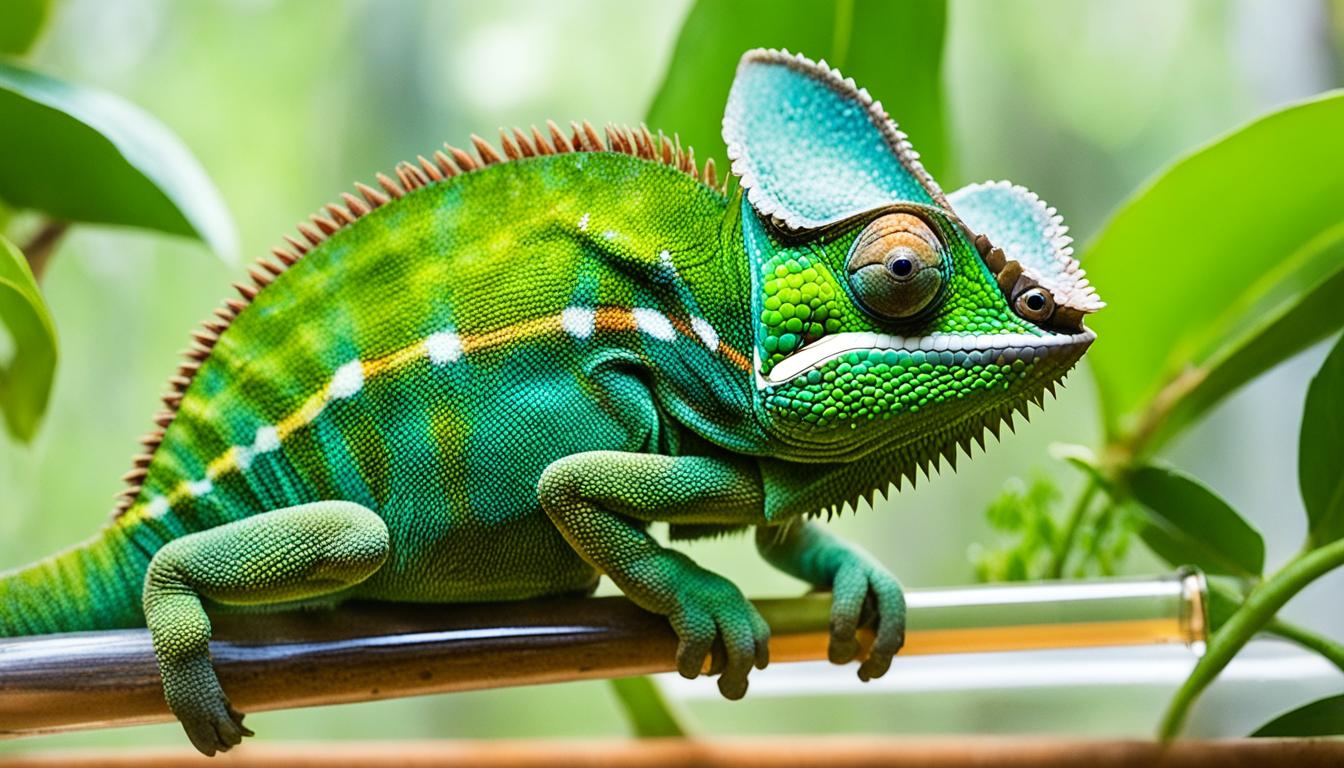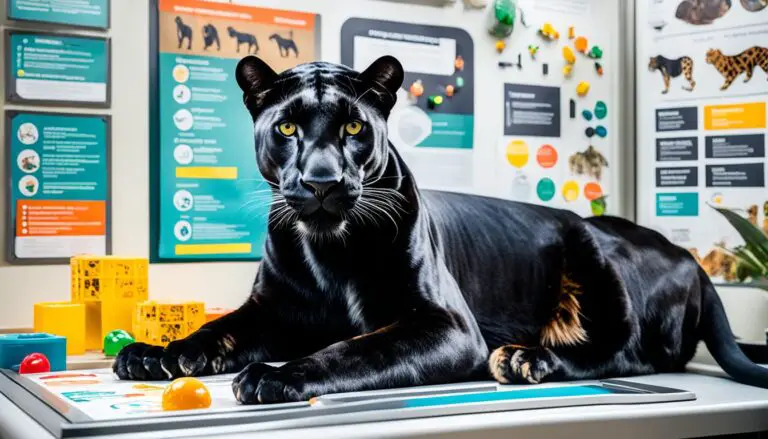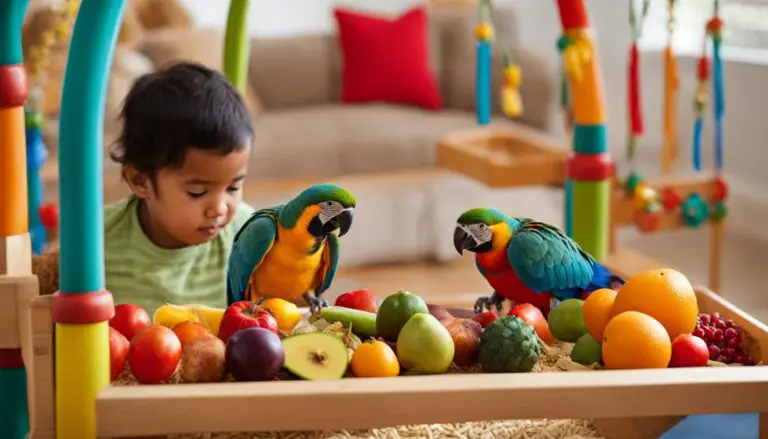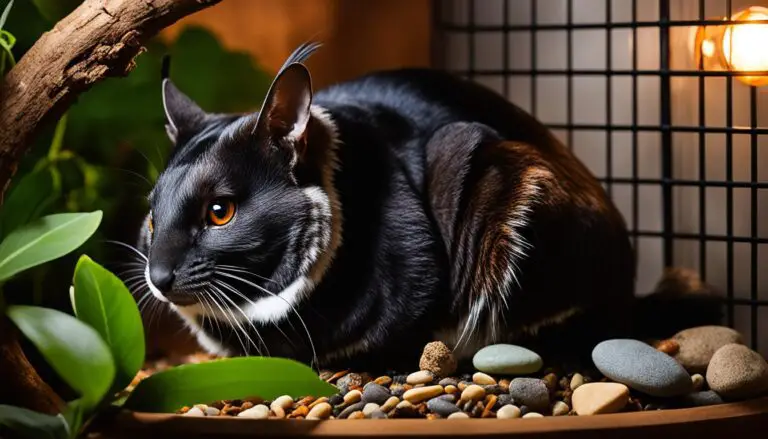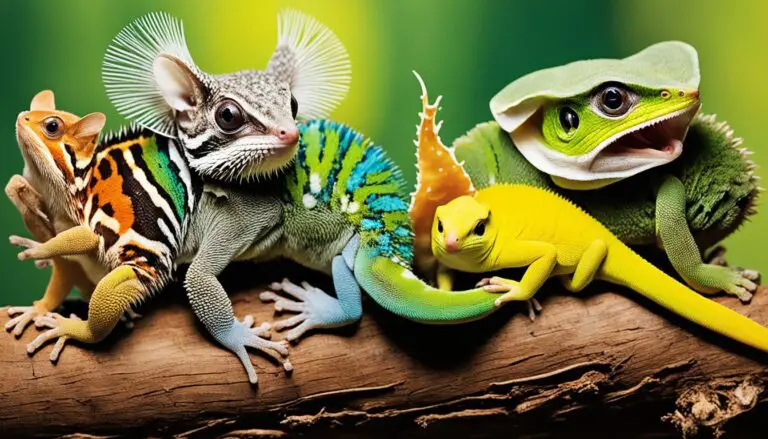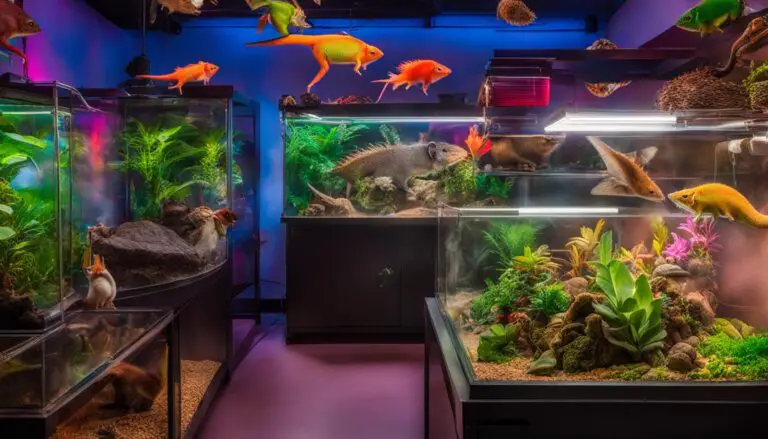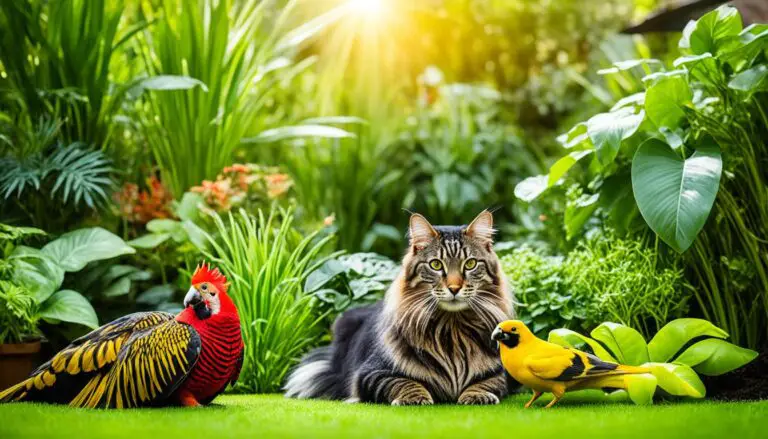Exotic Pet Care for Baby Pets (Guide)
Taking care of exotic baby pets requires specialized knowledge and attention. In this comprehensive guide, we will explore various aspects of exotic pet care to ensure the health and well-being of your unique little companions. From understanding their unique needs and behaviors to providing them with the right supplies, socialization, and veterinary care, we will cover everything you need to know to be a responsible and loving caregiver to your baby exotic pets.
Key Takeaways:
- Exotic pet care requires specialized knowledge and attention due to the unique needs of baby pets.
- Understanding their behavior and providing the right supplies is crucial for their well-being.
- Veterinary care and socialization play a vital role in maintaining the health and happiness of exotic baby pets.
- Creating a nurturing environment and providing proper nutrition are essential for their growth and development.
- Integrating professional care with home care ensures overall well-being and lifespan of exotic pets.
Understanding the Unique Needs of Exotic Baby Pets
Exotic baby pets require special care and attention due to their unique needs. As responsible owners, it is essential to understand and cater to these needs to ensure the well-being of your adorable companions. In this section, we will delve into three crucial aspects of caring for exotic baby pets: specialized habitats, recognizing natural behaviors and providing enrichment, and considering their longevity and future size.
The Importance of Specialized Habitats
Creating a specialized habitat for your exotic baby pet is vital for their overall health and happiness. These habitats should mimic their natural environment and provide them with the necessary conditions to thrive. Proper environmental factors such as temperature, humidity, and lighting play a significant role in the well-being of your exotic pet.
Exotic baby pets often have specific habitat requirements based on the species they belong to. Some may need access to aquatic environments, while others may require arboreal or terrestrial setups. Researching your pet’s species and consulting with experts will help you design and set up a suitable habitat that meets their unique needs.
Consider incorporating natural elements like plants, branches, and hiding spots to create a stimulating and enriching environment for your exotic baby pet. Providing them with ample space to explore, climb, and exhibit their natural behaviors is essential for their physical and mental well-being.
Recognizing Natural Behaviors and Providing Enrichment
Understanding and recognizing the natural behaviors of your exotic baby pet is key to their overall happiness and contentment. Different species have distinct behaviors and instincts that need to be catered to in captivity.
Enrichment activities are essential to keep your exotic baby pet mentally stimulated and engaged. These activities mimic their natural behaviors and provide them with opportunities for physical exercise and mental challenges. This can include puzzle toys, foraging activities, and interactive play sessions. Regularly introducing new and varied enrichment activities will prevent boredom and enhance their well-being.
It is crucial to observe your exotic baby pet’s behaviors and preferences to tailor their enrichment accordingly. By allowing them to indulge in their natural behaviors, you provide them with a fulfilling and enriching lifestyle.
Considering the Longevity and Future Size of Exotic Pets
When welcoming an exotic baby pet into your home, it is vital to consider their potential longevity and future size. Some exotic species can live for several decades, requiring a long-term commitment to their care and well-being.
Researching the average lifespan of your chosen exotic pet species will help you plan for their long-term care and ensure that you can provide them with a suitable environment throughout their lifespan. Understanding their future size is also crucial in terms of habitat requirements, feeding, and general care.
Keep in mind that the cute and tiny exotic baby pet you bring home will eventually grow into a fully matured adult. Planning ahead and ensuring that you have the space and resources to accommodate their future size is essential for their well-being and your ability to provide long-term care.
Understanding the unique needs of exotic baby pets, providing them with specialized habitats, recognizing and accommodating their natural behaviors, and considering their longevity and future size are essential steps in ensuring their well-being and happiness. By putting in the effort to meet these needs, you can provide a loving and nurturing environment for your exotic baby pets, allowing them to thrive throughout their lives.
Essential Exotic Pet Supplies for Optimal Health
Providing optimal health for your exotic baby pets requires the right supplies. In this section, we will discuss the must-have nutritional and feeding items, the importance of choosing the right enclosures and environmental controls, and grooming tools tailored specifically for exotic pet care.
Must-Have Nutritional and Feeding Items
Proper nutrition is essential for the health and well-being of your exotic baby pets. It is crucial to provide them with a balanced and species-specific diet. When selecting nutritional and feeding items, consider their unique dietary requirements. Choose high-quality food that is rich in essential nutrients and vitamins to support their growth and development.
Some key nutritional and feeding items for exotic baby pets include:
- Species-specific food formulated for their dietary needs
- Supplements to enhance their nutritional intake, if recommended by a veterinarian
- Feeding dishes that are easy to clean and sanitize
- Specialized feeding tools, such as feeding syringes or tongs, for smaller or delicate exotic pets
Consult with a veterinarian or exotic pet care specialist to ensure you are providing the appropriate nutritional and feeding items for your exotic baby pets.
Choosing the Right Enclosures and Environmental Controls
The right enclosures and environmental controls are crucial for creating a safe and comfortable living space for your exotic baby pets. Each species has different habitat requirements, so it’s important to research and understand their specific needs.
Consider the following factors when choosing enclosures and environmental controls:
- Size and type of enclosure suitable for their species
- Materials that are safe and durable
- Proper ventilation and temperature control
- Humidity levels that mimic their natural habitat
- Lighting that replicates their natural day-night cycle
It’s recommended to consult with an exotic pet care specialist or veterinarian to ensure you create an environment that meets the unique needs of your exotic baby pets.
Grooming Tools Tailored for Exotic Pet Care
Grooming plays a vital role in the overall health and well-being of your exotic baby pets. Regular grooming helps to maintain their hygiene, prevent matting or overgrown nails, and promote a strong bond between you and your furry friends.
When selecting grooming tools, choose those specifically tailored for exotic pet care, considering their unique needs. Some essential grooming tools for exotic baby pets include:
- Gentle brushes or combs suitable for their fur or feathers
- Nail clippers designed for small or delicate claws
- Ear and eye cleaners formulated for their species
- Toothbrushes and toothpaste approved for use in exotic pets
Remember to approach grooming sessions with patience and gentleness, offering positive reinforcement and rewards to make the experience pleasant for both you and your exotic baby pets.

Creating a Nurturing Environment for Baby Pet Growth
Creating a nurturing environment is vital for the healthy growth and development of baby exotic pets. By providing a suitable living space, regulating temperature and humidity, and offering mental and physical stimulation, you can support their growth milestones and ensure their well-being.
One important aspect of creating a nurturing environment is setting up a proper living space for your baby pet. Consider the specific needs of your exotic pet species and provide them with a habitat that mimics their natural environment as closely as possible. This could include providing appropriate enclosures, hiding spots, and perches.
Regulating the temperature and humidity in their environment is crucial to ensure their comfort and overall health. Research the optimum temperature and humidity levels for your baby pet’s species and invest in the necessary equipment, such as heating lamps or humidifiers, to maintain the ideal conditions.
Mental and physical stimulation is also essential for the healthy growth of baby exotic pets. Provide them with toys and interactive objects that encourage natural behaviors and engage their minds. Additionally, dedicate time each day to play and interact with your baby pet to promote socialization and prevent boredom.
Creating a nurturing environment for your baby exotic pets is essential for their healthy growth and development. By providing a suitable living space, regulating temperature and humidity, and offering mental and physical stimulation, you can ensure their well-being and support their growth milestones.
Exotic Pet Care for Baby Pets: Integrating Professional and Home Care
Integrating professional and home care is crucial in maintaining the health and happiness of baby exotic pets. When it comes to caring for these unique animals, it’s important to collaborate with reliable and knowledgeable exotic pet care specialists. They have the expertise to address the specific needs and requirements of exotic pets.
When seeking professional care, look for reputable individuals or facilities with experience in exotic pet care. Make sure they are licensed and have a good reputation in the industry. Consult with them regularly for guidance on diet, habitat setup, health check-ups, and any other concerns related to your baby exotic pets.

In addition to professional care, providing appropriate and consistent home care is equally important for the overall well-being of your baby exotic pets. Here are some tips to ensure the best care at home:
- Research and understand the specific needs of your baby exotic pet. Different species have different requirements, so it’s crucial to gather information and familiarize yourself with their unique characteristics and behavior.
- Create a suitable habitat. Set up an enclosure that closely mimics their natural environment, including the right temperature, humidity levels, bedding, hiding places, and stimuli.
- Follow a proper feeding and nutrition plan. Consult with your exotic pet care specialist to design a well-balanced diet that meets the nutritional needs of your baby exotic pet.
- Establish a routine. Regular feeding times, exercise, and socialization are essential for maintaining a healthy and happy exotic pet.
- Provide mental and physical stimulation. Enrichment activities such as toys, puzzles, and interactive playtime can help keep your baby exotic pets engaged and mentally stimulated.
- Maintain cleanliness and hygiene. Regularly clean the enclosure, provide fresh water, and groom your baby exotic pets as per the guidance of your exotic pet care specialist.
- Observe their behavior and consult with your specialist. If you notice any changes in their behavior or health, reach out to your exotic pet care specialist for advice and guidance.
By integrating professional care and providing consistent and appropriate home care, you can ensure the optimal health and well-being of your baby exotic pets. Remember, every effort you make in their care is an investment in their long and happy lives.
The Role of Veterinary Experts in Baby Exotic Pet Health
Veterinary experts play a crucial role in ensuring the health and well-being of baby exotic pets. These specialists have the knowledge and expertise to provide specialized care for these unique animals. Collaborating with exotic pet care specialists is essential in maintaining the optimal health of your baby exotic pets.
Identifying and Collaborating with Exotic Pet Care Specialists
When it comes to the health of your baby exotic pets, it is important to work with veterinary experts who specialize in exotic pet care. These specialists have the necessary experience and understanding of the specific needs and requirements of different exotic species. To identify competent exotic pet care specialists:
- Ask for recommendations from other exotic pet owners or local exotic pet organizations.
- Research and interview potential specialists. Inquire about their experience, qualifications, and familiarity with the specific species of your baby exotic pets.
- Visit their facilities and observe how they interact with exotic animals.
By selecting the right exotic pet care specialist, you can ensure that your baby exotic pets receive the best possible veterinary care throughout their lives.
Common Health Issues in Exotic Baby Pets and Emergency Preparedness
Despite their unique nature, baby exotic pets can still experience common health issues. It is essential for exotic pet owners to be aware of these potential health problems and prepared to take action when necessary. Some common health issues in baby exotic pets include:
- Respiratory infections
- Gastrointestinal disorders
- Parasitic infestations
- Nutritional deficiencies
- Skin problems
To ensure the well-being of your baby exotic pets, it is important to have a comprehensive emergency preparedness plan in place. This includes:
- Knowing the contact information of your exotic pet care specialist and emergency veterinary clinics.
- Having essential first aid supplies specific to exotic pets.
- Being familiar with common signs of distress or illness in your baby exotic pets.
- Regularly monitoring the health and behavior of your baby exotic pets.
In case of any emergency, it is always recommended to seek immediate veterinary attention.
Socialization and Training: Fostering Well-Adjusted Exotic Pets
Socialization and training play vital roles in ensuring that your baby exotic pets grow up to be well-adjusted and comfortable in various situations. By introducing them to different experiences and providing structured training, you can promote their overall well-being and enhance their ability to adapt to new environments. Additionally, positive reinforcement training techniques tailored to the specific needs of exotic pets can help reinforce desired behaviors and strengthen the bond between you and your furry friends.
When it comes to socialization, exposing your baby exotic pets to humans and other animals from an early age is essential. This helps them become familiar with different social cues and develop a sense of confidence when interacting with others. Gradually introduce them to new environments, people, and animals while monitoring their reactions and providing positive reinforcement for calm and friendly behavior.
Training exotic pets requires a patient and consistent approach. Positive reinforcement methods, such as using treats, praise, and play as rewards, are particularly effective in teaching them desired behaviors. Keep training sessions short and frequent, focusing on one command or behavior at a time. Avoid punishment-based techniques, as they can negatively impact the well-being of sensitive exotic pets.
Remember that exotic pets have unique needs and characteristics, so it’s crucial to tailor your training approach accordingly. Research the specific training methods and requirements for your chosen exotic pet species, and consult with experienced trainers or veterinarians who specialize in exotic pet care. They can provide invaluable guidance and support to ensure that your training efforts are effective and safe.
Conclusion
In conclusion, this guide has provided comprehensive information on exotic pet care for baby pets. We have covered essential topics such as specialized habitats, nutrition, grooming, veterinary care, and the importance of socialization and training. It is crucial to recap the key essentials of exotic baby pet care and emphasize the commitment required to provide lifetime care for these unique animals. By following the guidelines and being a responsible caregiver, you can ensure the health and happiness of your exotic baby pets for years to come.
Recap of Exotic Baby Pet Care Essentials
To ensure the well-being of exotic baby pets, there are several key essentials to keep in mind:
- Provide specialized habitats that mimic their natural environment and promote their physical and mental health.
- Offer a well-balanced diet and ensure proper nutrition for their specific needs.
- Maintain regular grooming routines to keep them clean and healthy.
- Establish a relationship with a knowledgeable exotic pet care specialist and prioritizing regular veterinary check-ups.
- Focus on socialization and training to foster well-adjusted pets.
The Commitment to Lifetime Care for Exotic Animals
It’s important to remember that exotic pets require a lifetime commitment. These unique animals often have specialized needs and can live for many years. As a responsible caregiver, it is crucial to provide them with the care, attention, and commitment they deserve throughout their entire lives. By investing the time, resources, and love necessary, you will be rewarded with a deep and fulfilling bond with your exotic baby pets.
Source Links
- https://www.rspca.org.uk/adviceandwelfare/pets/other
- https://exoticpetwonderland.org/exotic-pet-care-guides/
- https://anationofmoms.com/2020/09/exotic-pet-care.html
Peter Stones is the founder of Exotic Pets Place, the leading online resource for exotic pet care information.
With over 10 years of hands-on exotic pet ownership experience, he is deeply passionate about sharing his expertise to help others properly care for their unusual pets.
When he's not writing extensively researched articles or connecting with fellow exotic pet enthusiasts worldwide, you can find Peter at home tending to his own beloved menagerie of exotic animals.

